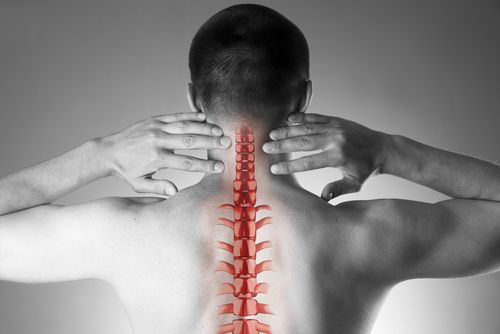
Neck cracking might be something you experience sitting at your desk every day. You might even bend your neck and rotate it to encourage it to pop and grind. Some people crack their necks in the same way that others crack their knuckles. It’s difficult to determine whether the reason is to relieve pressure or it’s just a habit. But sometimes the sounds that emit from your neck aren’t deliberate and it’s often accompanied by pain.
The sounds of neck cracking and grinding are called “neck crepitus” and they aren’t always well understood. Some commonly known causes include:
- Pressure changes within the facet joints
- Ligaments or tendons moving around the bone or near bony attachments
- Bones in close proximity grinding together
A joint is the area where two or more bones meet. They allow motion such as in the knee or wrist. The spine is made up of a special kind of joint that supports the body while also allowing some movement.
The spine extends from the base of the skull to the pelvis. It is divided into sections, starting with the lumbar spine at the lower back. The middle section is the thoracic spine while the cervical spine is the section along the neck. Each section of the spine contains a certain number of vertebrae. Each vertebra has two sets of facet joints, one facing upward and one facing down.
The facet joints are synovial joints, meaning each is surrounded by connective tissue and synovial fluid that lubricates the joint. These joints have a coating of cartilage that allows them to move easily against each other. During movement, adjacent bones rub together causing changes in the pressure in the joint. Sometimes this causes tiny gas bubbles to form and collapse. Some experts believe these gas bubbles sometimes play a role in neck cracking.
Significant research exists on what causes the popping sound when you crack your knuckles. Knuckles are also synovial joints like those in the spine. The problem is that the results don’t always turn out exactly the same. Some suggest that the sound occurs when the bubble forms. Others suggest it is when the bubble collapses. Still, the idea of the cracking noise coming from the gas bubbles is generally accepted.
Ligaments and tendons are types of soft tissue that work with the bones to help them move or to keep them stable. Both types of tissue attach to bones and they are elastic, allowing them to “snap back” into place like a rubber band. Some reasons they might cause crepitus include:
- Aging
- Swelling or stiffness
- Sudden or awkward movement
- Injury to the soft tissue
- Over-extending the ligaments or tendons
- Changes caused by surgery
These causes of neck cracking are only theoretical. No studies have proven that they are the reason you hear noise from your neck.

The human body has built-in safety features to prevent damage from occurring to joints. The cartilage in facet joints acts as a cushion between the joints. As you age, the cartilage may wear down, allowing the bones to come into contact. When you move, one bone grinds against the other.
When bone grinding causes noises, it usually includes pain and a limit in your ability to move your neck. If you hear the sounds every time you make the same movement, it’s probably due to bone grinding.
When patients complain to their doctors about neck crepitus, finding the mechanism isn’t usually an issue. Instead, the doctor finds the cause of pain and treats it. Those who don’t experience pain with the sounds don’t usually seek treatment at all. Like cracking in the knuckles, many people think it is harmless, even if they find the sounds annoying. Most of the time, they’re right.
Still, there are some instances where neck crepitus calls for medical attention. Any time there is pain or swelling, there’s inflammation in the joints. It might be a symptom of osteoarthritis or some other condition.
“Tech Neck” is the modern condition that causes neck pain. It develops when you repeatedly use your devices and strain the muscles and connective tissues around your neck. If you constantly look at your cell phone, laptop, or other devices, it could be the cause of your neck pain.
Posture also plays a role in developing this condition. Maintaining poor posture at your desk for hours each day puts a strain on your neck. The type and severity of pain vary from person to person. It can also change for you during different times of the day.
Also, if you’ve experienced an accident or injury and the sounds are new, it might signal a change to the structure of the neck. The same is true following recent surgeries to the cervical spine. It’s especially important to have the sounds checked out if they’re accompanied by pain.
Most of us experience neck cracking and popping from time to time. But when it occurs frequently or all the time, it might be a problem in the joint. If the sounds are persistent enough to cause concern, get them checked out. You might never know the cause of your neck sounds, but the doctor can rule out underlying conditions that might need to be addressed.
If your mother ever told you to stop cracking your knuckles or you’d get arthritis, you might wonder if cracking your neck will have the same effect. Although there aren’t a lot of studies to support or disprove that theory, significant data on knuckle cracking is available. Research shows that frequent, deliberate knuckle cracking doesn’t increase the risk of developing arthritis. That means neck cracking probably doesn’t increase the risk of developing arthritis in the neck. But the fact that you do it repeatedly to get short-term relief proves that it isn’t a long-term solution either.
Self-chiropractic is a short-term solution that you are doomed to repeat over and over. Still, many people compulsively need to crack their neck to keep getting relief. Most believe the immediate relief comes from the popping sound, or cavitation, that occurs when you realign the joint. But it’s the improvement in the function of your joints that make you feel better. The reason that the relief isn’t long-term is that you’re more likely to elicit a pop from a different joint.
One reason experts advise people against self-chiropractic is the risk of damaging other tissues. Nerves and blood vessels run throughout the neck. If you don’t know the correct way to crack your neck, you could cause damage and more problems.
Doctors often refer patients with neck cracking and popping to chiropractors. The chiropractor then examines the person and tries to determine the cause of the noises and pain if it is present.
Chiropractors offer non-surgical treatment for a range of neck conditions that cause pain and/or cracking. Instead of providing a short-term solution for the noises, they treat the cause of the sounds. Some of the neck conditions that chiropractic treatment works for include:
- Facet Joint Sprain
- Whiplash
- Cervical Intervertebral Disc Injuries
- Degenerative Joint Syndrome
- Cervical Sprain Injuries
The chiropractor diagnoses neck pain by examining the spine, taking X-rays of the head and neck, and performing other diagnostic tests. If your spine is out of alignment, it can affect more than your neck. The pain and other conditions can extend to other areas of the body.
You should provide the chiropractor with your past medical history and information on diseases and conditions in your family. They will use all this information to diagnose the source of your pain. Once they make a diagnosis, they will create a treatment plan that is right for you.
Chiropractors use a range of treatments for various neck conditions. Spinal manipulation and manual therapy are often included. Sometimes patients seek chiropractic care after medical treatments fail. Spinal manipulation can help restore movement, alleviate pain, and make you feel normal again.

Most of us have heard people claim that chiropractic treatment didn’t work for them. Sometimes it isn’t effective for treating certain conditions. But often the person expects total, long-term relief after a single treatment.
Everyone is different, and so are their needs. Some patients are fine after a single treatment while others require repeated visits to get their body realigned. Although neck cracking and popping might seem like a simple matter, it’s the underlying condition that determines the type and extent of treatment that you need.
Sometimes patients only undergo one treatment and never return. Their reason might be that they feel so much better after one treatment, they falsely believe the problem is fixed. Even though the first treatment might correct the pain or the neck crepitus, the cause of their symptoms requires more treatment. Over time, the symptoms are likely to return.
Some patients give up after one treatment because they don’t feel as good as new. Chiropractic treatment is a process that sometimes requires taking short, measured steps.
Chiropractic treatment isn’t just about targeting the source of your pain. It is a comprehensive treatment that affects the health of your whole body. In addition to using manipulation techniques for realignment, the chiropractor might also suggest lifestyle changes. For example, if you have tech neck, he might recommend limiting the use of your devices or implementing ergonomic seating at your desk.
Nutrition also plays a vital role in keeping your entire body healthy. Getting the right nutrients supports your body’s ability to heal itself.
The chiropractor might also recommend conservative care for you to apply at home. They might suggest applying heat and/or cold therapy or taking over-the-counter NSAIDs for temporary pain relief. Following your chiropractor’s advice will help you get better results in the fastest time possible. It will also contribute to your overall health and well-being.
If cracking your neck has become an addiction, the first step is to stop. Although the risk is very minor, the practice does increase your risk of having a stroke. It could also be what’s keeping you from getting the real help you need.
If you work on a computer or spend a lot of time using your devices (and who doesn’t these days?) take frequent brakes and look down from the screen regularly. Gently stretching your neck might give you some relief and it’s a safer alternative to popping.
Before visiting a medical doctor or orthopedic surgeon about your pain or neck noises, make an appointment with a chiropractor. While chiropractic isn’t used to treat some conditions, it is effective for many. Wouldn’t you rather have a drug-free, non-surgical treatment that works and is safe?
Sometimes neck cracking and popping is annoying. Other times it’s a sign of something more serious going on in your neck. If there’ damage to your cervical joints, failing to get treatment allows it to get worse. If you’ve had an injury during sports play, you might have more damage than you realized. Even if the cause of the noises and pain in your neck aren’t treatable with chiropractic care, a chiropractor can identify the source of your symptoms. Then, you’ll know what the next step is to get relief and restore your cervical spine.
Chiropractic treatment is one of the safest and most effective forms of treatment for neck pain. Many people prefer the non-surgical or drug-free approach to treatment. For others, those aren’t an option due to other medical conditions.
Of course, all chiropractors aren’t the same. Different treatment centers use different techniques to achieve the same goal. The key to getting expert care for your needs starts with a chiropractor who is a good fit for you.
If you’ve been bothered by neck cracking and grinding or popping, contact True Spine Chiropractic today. Our approach to correcting upper cervical spinal misalignments helps restore the body and facilitate healing. Our treatment helps alleviate neck symptoms that are affecting your entire body.
[wpcode id="610"]